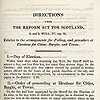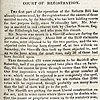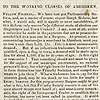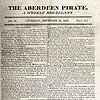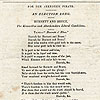
| Introduction |
| The Inheritance |
| Reform to 1850 |
| 1850-1900 |
| Twentieth Century |
| Entire Collection |
| Search the Collection |
| Radical Songs |
| Further Reading |
| Acknowledgements |
| Home |
The Voice of Radicalism
Entire Collection
There are 173 entries in the Collection.
| Image | Title | Item Description |
|---|---|---|
|
Directions from The Reform Act for Scotland Relative... |
This pamphlet provides instructions on how to conduct an election under the rules of the 1831 Reform Act for Scotland. On the first page, note how the directions state that the Sheriff should 'proclaim (read aloud) the writ at the market cross'. Today, newspapers, the radio and television let us know... |
|
|
Aberdeen City Election |
This pamphlet describes the conditions that voters must satisfy if they are to be elegible to vote. Voters must live within seven miles of the city boundaries; property must be worth at least £10 per year. Note how taxes on a property must also be up to date if the owner or tenant is to be allowed to... |
|
|
Letter to the Aberdeen Chronicle about the forthcoming... |
The first page of an excerpt from a letter to the Editor of the Aberdeen Chronicle. The writer is concerned about the bias of the Tory produced pamphlet, 'Remarks on the Principles of the opposing Candidates for the Representation of Aberdeenshire'. The two candidates for the 1832 election in Aberdeenshire... |
|
|
Memo belonging to Alexander Bannerman's Election Agent,... |
Memo. This was attached to an 1832 List of Electors which belonged to Alexander Bannerman's election agent. The memo states: 'This list was scored from a copy belonging to the Agent in the Reform Interest. All these [names] scored were pledged to Mr Bannerman or known to be favourable to Reform.' Alexander... |
|
|
Court of Registration |
For the first general election in 1832, the names of all those entitled to vote had to be registered by the Sherriffs. Note how nearly a quarter of those people claiming the right to vote were disallowed. This might be because the claimant did not own or occupy property with an annual value of £10. |
|
|
Letter to the Editor of the Aberdeen Pirate about Reform |
The writer takes issue with John Davidson's pamphlet, 'A Letter to the Working Classes of Aberdeen'. Davidson, a printer to trade, was a committed Reformer. The writer of this letter is disagreeing with Davidson's Tory viewpoint. |
|
|
John Davidson and the Working Classes |
The writer feels that John Davidson's pamphlet on Reform and the workers, ' A Letter to the working classes of Aberdeen', is more concerned with Davidson's own self-interest, rather than with the interests of the workers of Aberdeen. In his pamphlet, Davidson continually refers to his own part in bringing... |
|
|
Letter to the Aberdeen Pirate |
This letter points out the financial demands made on a tradesman starting out in business in the early 1830s. The letter L is used to signify the pound sign (£). |
|
|
Burgh Reform |
In this Leader, the editor points out that many other reforms will follow electoral reform, including Burgh, Corporation and Church Reform. He hopes, however, that the legislators and the population will not go too far, and that any future reforms will be moderate. |
|
|
City and County Elections |
The opening paragraph describes how the first 'general' election held in the city of Aberdeen was conducted. The leader mentions some of Alexander Bannermans's views on pressing subjects of the day and hopes that the electors will have no cause to regret their choice. |
|
|
An Election Song, Burnett and Bruce |
Political ballads, set to well-known tunes, were popular during the nineteenth century. This electioneering song discussing Aberdeenshire Whig candidates, is anti-Tory in sentiment. |
|
|
An Electioneering Retrospect, December 1832 |
In this article, the editor of the Aberdeen Pirate considers the Aberdeenshire results of the first 'general election' which took place the previous week. As a Whig, he was not pleased with the Tory win, but points out that the Whig candidate, Sir Michael Bruce, had a large support in spite of this.... |
|
|
Church Reform, Aberdeen Pirate 1833 |
The editor of the Aberdeen Pirate feels that Reform should be available wherever it is needed, but that people should be careful how they used it. The Church was in need of reform, especially in the area of Patronage. Reform in the Church, through the Disruption, was to take another ten years. |
|
|
Outs and Ins, A New Song |
This political song in the Aberdeen dialect, pokes fun at the outgoing town council. Corruption was rife - many instances are humorously referred to here. For example, the writer refers to the fiasco of the new harbour in verse 2, and is delighted that there is to be an election for new burgh magistrates. |
|
|
Our New Magistrates 1833 |
The editor of the Aberdeen Pirate is delighted that none of the old council have been re-elected, and commends the citizens of Aberdeen for their good sense. He also points out that the new council should not indulge in 'feasting at the public expense' and that they should conduct council business in... |

